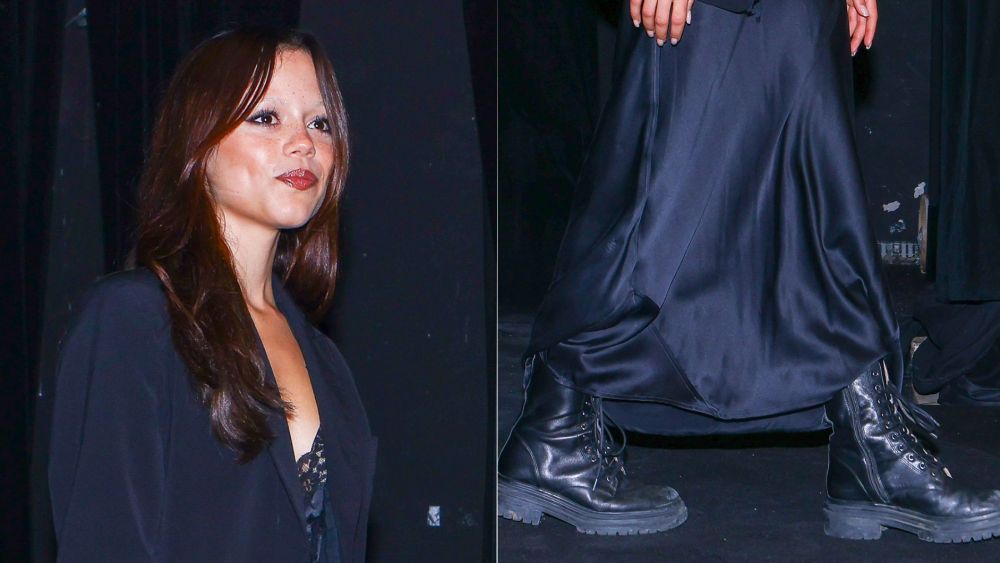Jean MackenzieSeoul correspondent
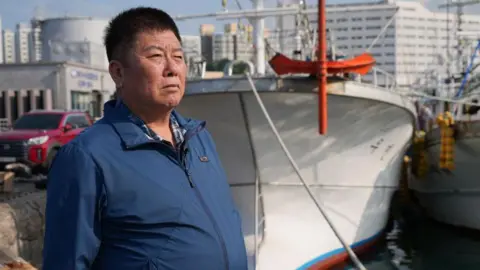 BBC/Hosu Lee
BBC/Hosu LeeHong Suk-hui was waiting on the shore of South Korea’s Jeju Island when the call came. His fishing boat had capsized.
Just two days earlier, the vessel had ventured out on what he had hoped would be a long and fruitful voyage. But as the winds grew stronger, its captain was ordered to turn back. On the way to port, a powerful wave struck from two directions creating a whirlpool, and the boat flipped. Five of the 10 crew members, who had been asleep in their cabins below deck, drowned.
“When I heard the news, I felt like the sky was falling,” said Mr Hong.
Last year, 164 people were killed or went missing in accidents in the seas around South Korea – a 75% jump from the year before. Most were fishermen whose boats sunk or capsized.
“The weather has changed, it’s getting windier every year,” said Mr Hong, who also chairs the Jeju Fishing Boat Owners Association.
“Whirlwinds pop up suddenly. We fisherman are convinced it is down to climate change.”
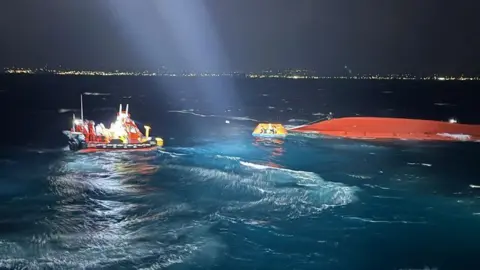 South Korean Coastguard
South Korean CoastguardAlarmed by the spike in deaths, the South Korean government launched an investigation into the accidents.
This year, the head of the taskforce pinpointed climate change as one of the major causes, as well as highlighting other problems — the country’s aging fishing workforce, a growing reliance on migrant workers, and poor safety training.
The seas around Korea are warming more rapidly than the global average, in part because they tend to be shallower. Between 1968 and 2024, the average surface temperature of the country’s seas increased by 1.58C, more than double the global rise of 0.74C.
Warming waters are contributing to extreme weather at sea, creating the conditions for tropical storms, like typhoons, to become more intense.
They are also causing some fish species around South Korea to migrate, according to the country’s National Institute of Fisheries Science, forcing fisherman to travel further and take greater risks to catch enough to make a living.
Environmental campaigners say urgent action is needed to “stop the tragedy occurring in Korean waters”.
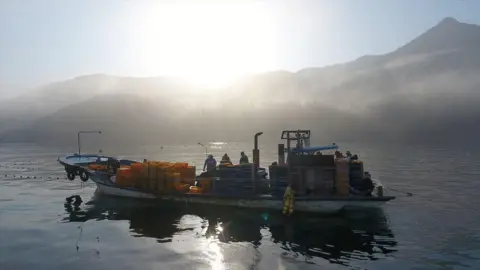 BBC/Hosu Lee
BBC/Hosu LeeOn a rainy June morning, Jeju Island’s main harbour was crammed with fishing boats. The crews hurried back and forth between sea and land, refuelling and stocking up for their next voyage, while the boats’ owners paced anxiously along the dock watching the final preparations.
“I’m always afraid something might happen to the boat, the risks have increased so much,” said 54-year-old owner, Kim Seung-hwan. “The winds have become more unpredictable and extremely dangerous.”
A few years ago, Mr Kim began to notice that the popular silvery hairtail fish he relied on were disappearing from local waters, and his earnings plunged by half.
Now his crews have to journey into deeper, more perilous waters to find them, sometimes sailing as far south as Taiwan.
“Since we’re operating farther away, it’s not always possible to return quickly when there’s a storm warning,” he said. “If we stayed closer to shore it would be safer, but to make a living we have to go farther out.”
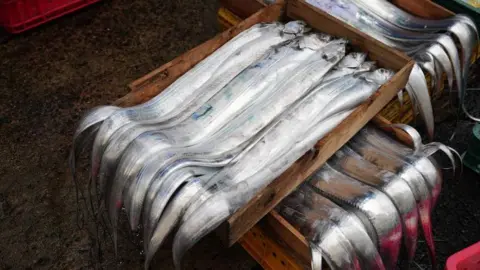 BBC/Hosu Lee
BBC/Hosu LeeProfessor Gug Seung-gi led the investigation into the recent accidents, which found that South Korea’s seas appear to have become more dangerous. It noted the number of marine weather warnings around the Korean Peninsula – alerting fishermen to gales, storm surges, and typhoons – increased by 65% between 2020 and 2024.
“Unpredictable weather is leading to more boats capsizing, especially small fishing vessels that are going further out and are not built for such long, rough trips,” he told the BBC.
Professor Kim Baek-min, a climate scientist at South Korea’s Pukyong National University, said that although climate change was creating the conditions to make strong, sudden wind gusts more likely, a clear trend had not yet been established – for that, more research and long-term data is needed.
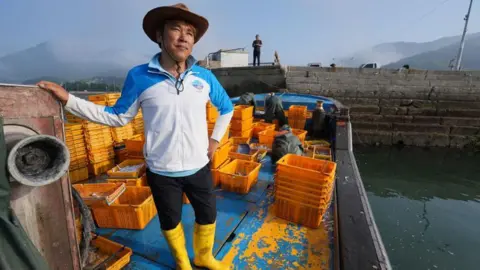 BBC/Hosu Lee
BBC/Hosu LeeOne foggy morning, we left shore in the dark on a small trawler with Captain Park Hyung-il, who has been fishing anchovies off Korea’s south coast for more than 25 years. He sang sea shanties, determined to stay upbeat. But when we reached the nets he had left out overnight, his mood crumpled.
As he wound them in, the anchovies could barely be seen among the hordes of jellyfish and other fodder. Once the anchovies had been separated out, they filled just two boxes.
“In the past, we’d fill 50 to 100 of these baskets in a single day,” he said. “But this year the anchovies have vanished and we’re catching more jellyfish than fish.”
This is the predicament facing tens of thousands of fishermen along South Korea’s coastlines. Over the past 10 years, the amount of squid caught in South Korean waters each year has plummeted 92%, while anchovy catches have fallen by 46%.
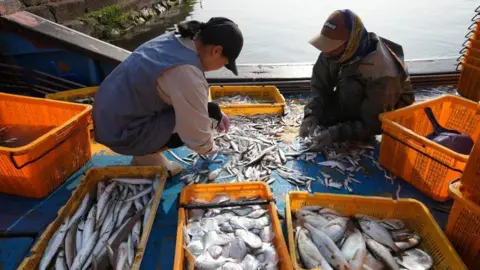 BBC/Hosu Lee
BBC/Hosu LeeEven the anchovies Park had caught were not fit for market, he said, and would need to be sold as animal-feed.
“The haul is basically worthless,” he sighed, explaining it would barely cover the day’s fuel costs, let alone his crew’s wages.
“The sea is a mess, nothing makes sense anymore,” Park continued. “I used to love this job. There was joy knowing that someone, somewhere in the country was eating the fish I caught. But now, with barely anything to catch, that sense of pride is fading.”
And, with livelihoods disappearing, young people no longer want to join the industry. In 2023 almost half of South Korea’s fishermen were over the age of 65, up from less than a third a decade earlier.
Increasingly, elderly captains must rely on help from migrant workers from Vietnam and Indonesia. Often these workers do not receive sufficient safety training, and language barriers mean they cannot communicate with the captains – further compounding the dangers.
Woojin Chung, a researcher at the Environmental Justice Foundation, a UK-based charity, described it as “a vicious and tragic cycle”.
When you combine more extreme weather with the pressure to travel further, the increased fuel costs this brings, and the need to rely on cheap, untrained foreign labour, “you have a higher chance of meeting disaster”, she explained.
 BBC/Hosu Lee
BBC/Hosu LeeOn 9 February this year, a large shipping trawler sank suddenly near the coastal city of Yeosu, killing 10 of the crew. It was a bitterly cold, windy day, and smaller boats had been banned from going out, but this trawler was deemed sturdy enough to withstand the gales. The reason it went down is still a mystery.
One of those killed was 63-year-old Young-mook. A fisherman for 40 years, he had been planning to retire, but that morning someone called and asked him to fill a last-minute opening on the boat.
“It was so cold that once you fell in you wouldn’t survive the hypothermia, especially at his age,” said his daughter Ean, still distraught over his death.
Ean thinks it has become too easy for boat owners to blame climate change for accidents. Even in cases where bad weather plays a role, she believes it is still the owners’ responsibility to assess the risks and keep their crew safe. “Ultimately it is their call when to go out,” she said.
 BBC/Hosu Lee
BBC/Hosu LeeAs a child, she remembers her father’s fridge would be filled with crabs and squid. “Now the stocks are gone, but the companies still force them to go out, and because these men have worked as fishermen their whole lives, they don’t have alternative job options, so they keep fishing even when they’re too frail to do so,” she said.
Ean also wants owners to better maintain their boats, which are aging too. “Companies have insurance, so they get compensated after a boat sinks, but our loved ones can’t be replaced.”
The authorities, aware they cannot control the weather, are now working with fishermen to make their boats safer. As we were with Mr Hong, whose boat capsized earlier this year, a team of government inspectors arrived to carry out a series of on-the-spot checks on two of his other vessels.
The government’s taskforce is recommending that boats be fitted with safety ladders, fisherman be required to wear life jackets, and that safety training be mandatory for all foreign crew. It also wants to improve search and rescue operations, and for fisherman to have access to more localised and real-time weather updates.
Some regions are even offering to pay fishermen for the jellyfish they catch, to try to clean up the seas, while squid fishermen are being given loans to protect them from bankruptcy, and encourage them to retire.
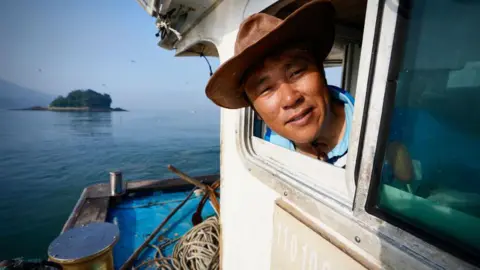 BBC/Hosu Lee
BBC/Hosu LeeBecause the problem will likely worsen. The UN’s Food and Agricultural Organisation forecasts that total fish catches in South Korea will decline by almost a third by the end of this century, if carbon emissions and global warming continue on their current trajectories.
“The future looks very bleak,” said the anchovy fisherman Captain Park, now in his late 40s. He recently started a YouTube channel documenting his catches in the hope of earning some extra money. Park is the third generation of his family to do this work and likely the last.
“Back then it felt romantic getting up early and heading out to sea. There was a sense of adventure and reward.”
“These days it’s just really tough.”
Additional reporting by Hosu Lee and Leehyun Choi



